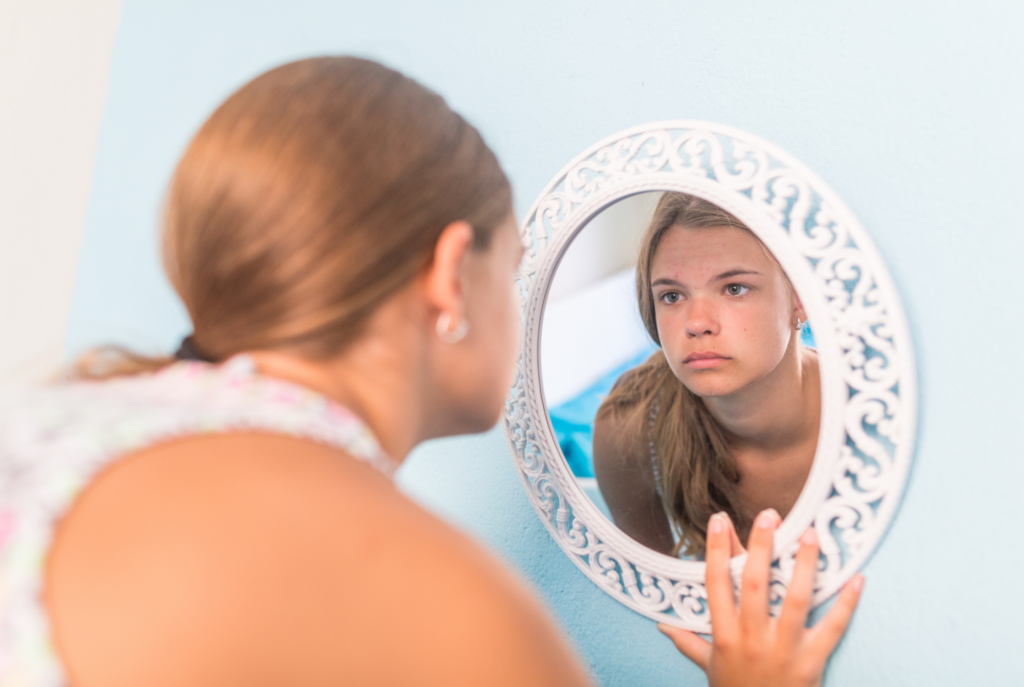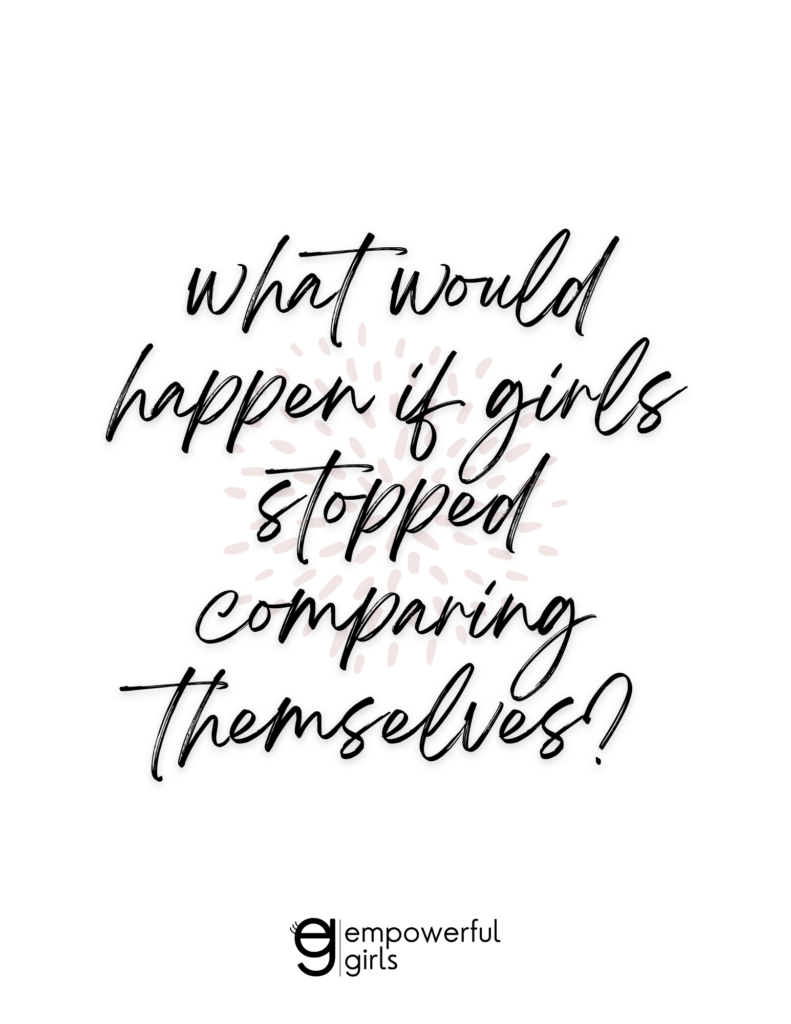
Comparing Ourselves
Recently I’ve received multiple messages from girls who are having a hard time with comparison. Maybe you, too, have felt this as you’ve noticed some classmates began to grow up–and others glow up. Or maybe you’ve compared your grades, abilities, the number of friends you have. If I asked you to think of a female celebrity or “popular” girl in your school and tell me about them, I wonder what things you’d mention. Perhaps you would point out things you DO like about that girl AND the things you DON’T like about yourself. I don’t actually want you to try that exercise, I’m trying to illustrate that, especially for girls, our natural tendency is to compare ourselves to others–usually their “best” vs. our “worst.”
Have you heard the term “comparison trap”? That’s literally what comparing yourself to others can do: trap you in a spiral of jealousy, discouragement, and resentment. U.S. President Theodore Roosevelt said, “Comparison is the thief of joy.” And he was right. Comparison steals your confidence, takes the fun out of things, and makes everyone miserable.
Social Comparison Theory
Back in 1954, long before Instagram, social psychologist Leon Festinger developed the concept of social comparison theory–the idea that people feel compelled to evaluate themselves by comparing themselves to others. There are two kinds of social comparisons: upward and downward.
Upward social comparison is when we compare ourselves to someone we feel is better than us in some way. Usually this is not a productive comparison. We see their looks, accomplishments, things they can do, and we may feel inferior, less than, not good enough, even hopeless. We tend to make upward social comparisons more than downward, but that doesn’t mean it can be less harmful.
In downward social comparison, we compare ourselves to someone we feel we’re better than in some way. Again, usually this approach isn’t productive. I view it as a defense mechanism for our pride, a way to reassure ourselves. We assume that putting someone down will elevate us, but not only is the false confidence boost short-lived, that comparison doesn’t put us in an effective headspace.
Sometimes we might apply both upward and downward social comparison. If we feel someone is better than us at one thing–they scored higher on a project, their hair always looks amazing, whatever upward comparison it is–THEN we reverse to a downward comparison and find something we think we’re better at than them–at least I got picked for a solo, or I have more followers, or some other petty dig on them.
Comparison of Everyone Everywhere
No matter which direction we compare, if it’s done through a negative lens, it’s not gonna help us. But even if you know that, it’s probably not going to prevent you from comparing yourself to someone in the future. Again, this is a natural human tendency. Everyone compares themselves to others, or has been compared to others by someone else. The most successful women in science, business, politics, sports, film, pretty much any industry, even supermodels have all been unfairly and ruthlessly publicly compared by critics. Even if their accomplishments had nothing to do with their appearance, hecklers have reduced women to their looks and their bodies in an effort to diminish her importance, or her intelligence, or her worth. And I imagine those women had a hard time not internalizing those projected comparisons, not thinking those things about herself.
Shift Away from Comparison
So how can you handle comparison, both originating from yourself and from others? First, I think it’s important that you acknowledge your feelings–self-consciousness, envy, longing, frustration, etc. I say it a lot–name your feelings, it’ll help you better-understand what’s going on in your head and in your life. With that, practice self-compassion and treat yourself with the kindness you would show to a close friend. These two things will help you work through your emotions to a more mindful place, where you can get to the root of where the comparison stems from.
Helpful Social Comparison
Next, I want to note that upward and downward social comparisons aren’t inherently bad. In some circumstances, there is a way to apply them that can produce a more positive result. These approaches aren’t our natural go-to, but if you can learn how to do them, they can change your trajectory. With upward social comparison, you can view someone who’s better at something as inspiration. You can admire their achievement, see them as a role model, and follow their example. It’s not about copying what they’ve done or being better than them, it’s recognizing it can be done, they’ve already carved a path to it, and you can work toward that goal too using your own individual strengths. With downward social comparison, if someone isn’t as good at something as you are, be grateful for your strengths or situation and take the opportunity to help them improve theirs. You both will benefit from it far better than any other comparison approach.
Embrace + Accept Yourself
You’ll likely compare yourself to someone in the near future, because again that’s a natural tendency. When you do, consider what purpose comparing yourself serves. Ask yourself why you’re seeking approval from others. Maybe you need to do some inner work to help you embrace who you are and accept who you aren’t. Practicing self love will allow you to recognize your worth and know that you are enough. You can free up so much time and energy and mental space to use on things that matter way more than how you measure up to someone else.
What Would Happen If Girls Stopped Comparing Themselves?
Imagine: what would happen if girls stopped comparing themselves? I’m gonna say that again, let it sink in–imagine what would happen if girls stopped comparing themselves? No longer would doubt and insecurity push girls down and hold them back. No longer would they be hindered by the hurdles of comparison. If girls stopped comparing themselves, I believe girls would literally be unstoppable. But this isn’t some daydream fantasy, we can start making this change. We can stop comparing ourselves and more girls can follow our lead. Instead of looking sideways at others competing against us, we can channel our energy and focus on accomplishing our own personal best with our goals and our dreams. And we can cheer on and support other girls who are doing the same for themselves. This movement starts with us shifting away from comparison, embracing and accepting ourselves, and growing self-confidence.
What Would Happen If Girls Stopped Comparing Themselves? Poster Printable
To help you remember all of this, I created a “What would happen if girls stopped comparing themselves?” poster for you to print out, personalize, and post on your wall where you’ll see it, remember it, practice it, and believe it — that’s the important part.
Resources
If you have a topic suggestion, I’d love to hear from you! Send an email (tweens get the OK from your parents) to hello@EmpowerfulGirls.com .
If you have social media already, follow me on Insta or tiktok @empowerfulgirls. I’m not encouraging or endorsing social media, but I’m on there to offer an unfiltered, uplifting alternative to what’s in your feed. Remember to get on the email list for the newsletter!
Also, if you enjoy listening to 10 for Teens + Tweens, I would truly appreciate you telling your friends about this podcast or leaving a review so others can find it and feel uplifted, too! Your support means the world to me!
